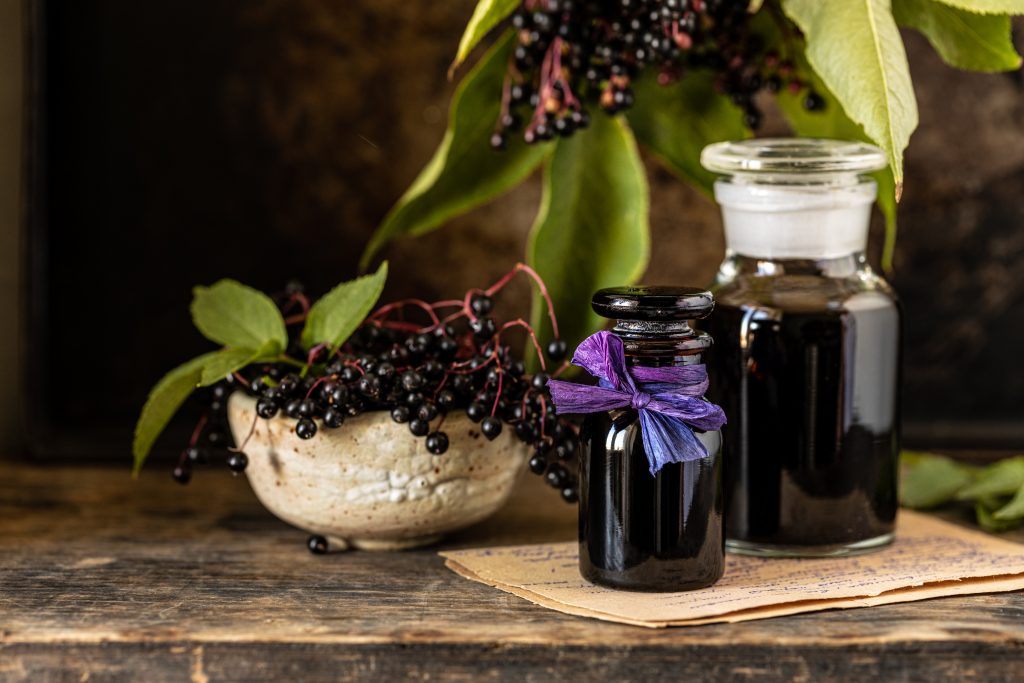What Is Elderberry?
Sambucus is a genus of flowering plants in the family Adoxaceae. The different species of Sambucus are commonly called elderberry or elder. The berries and flowers of the elder plant are used as medicine.
Elderberry is native to Europe, Africa and parts of Asia, but it’s become common in the U.S. It has deciduous leaves, white flowers (elderflowers) and berries that turn from green to red to black when ripe. Elder is commonly found growing in woodlands and hedgerows.
Health Benefits and Uses
1. Provides Cold and Flu Relief
One of the most well-studied elderberry syrup benefits is its powerful immune-boosting properties. The berries contain chemical compounds called anthocyanidins, which are known to have immunostimulant effects.
Research actually shows that elderberry extract is a safe, efficient and cost-effective treatment for cold and flu symptoms.
2. Reduces Sinus Infection Symptoms
With elderberry’s anti-inflammatory and antioxidant properties, it makes sense that it can help treat sinus issues. A sinus infection is a condition in which the cavities around the nasal passages become inflamed, and this antiviral herb has promise as a sinus infection natural remedy.
A study conducted by the Institute of Complementary Medicine’s Department of Internal Medicine at the University Hospital in Zurich, Switzerland examined the use of a product called Sinupret, which contains elderberry extract. The researchers used Sinupret to treat bacterial sinusitis along with an antibiotic (doxycycline or vibramycin) and a decongestant. Interestingly enough, those who took the combination did better compared to those who did not take Sinupret at all.
3. Acts as a Natural Diuretic
A diuretic is a substance that promotes the production of urine. Doctors prescribe diuretics when the body retains too much fluid, which is a common problem in older adults. Thanks to its ability to act as a natural diuretic, elderberry has been shown to promote both urination and bowel moments to help protect against fluid retention.

4. Supports Skin Health
Elderberry has made its way into cosmetic products, and for good reason. Its content of bioflavonoids, antioxidants and vitamin A makes it awesome for skin health. Not only that, but researchers also suspect that a compound found in the berry could give a natural boost to skin.
Anthocyanin is a type of natural plant pigment found in elderberry that has been shown to have anti-inflammatory and antioxidant properties. Some researchers suspect that this compound may improve skin’s structure and condition to enhance overall skin health.
5. Eases Allergies
In addition to using elderberry syrup for colds, the flowers of the elder plant are also known to be an effective herbal allergy remedy. Since allergies involve an overreaction of the immune system as well as inflammation, the herb’s ability to improve immune function and calm inflammation can help provide allergy relief.
Some herbalists put black elder flower on the list of most effective herbs used for treating hay fever-like symptoms. It can be used for allergies on its own or in combination with other herbs and natural remedies.
6. Could Have Cancer-Fighting Effects
Edible berry extracts like elderberry extract are rich in anthocyanins and have been shown to have a broad spectrum of therapeutic, pharmacologic and anti-carcinogenic properties. In vitro studies specifically indicate that the elderberry has some chemopreventive properties, which can help inhibit, delay or reverse cancer formation.
One study published in the Journal of Medicinal Food compared the anticancer properties of European and American elderberry fruits. European elderberry (Sambucus nigra) is known for its medicinal use and contains anthocyanins, flavonoids and other polyphenolics, which all contribute to the high-antioxidant capacity of its berries. American elderberry (Sambucuscanadensis) has not been grown or promoted as a medicinal plant like its European relative.
This study tested extracts of both berries to assess anticancer potential and found that both demonstrated significant chemopreventive potential. Additionally, the American elder extract showed inhibition of ornithine decarboxylase, which is an enzyme marker related to the promotion stage of cancer formation. Thus, elderberries show potential as cancer-fighting foods.
7. May Improve Heart Health
Although studies have found mixed results, some research suggests that elderberry extract may improve heart health. For example, one animal model showed that giving mice with high cholesterol and HDL cholesterol dysfunction anthocyanin-rich black elderberry extract helped reduce hepatic cholesterol levels and improved HDL function. This may be due to the presence of anthocyanins, which are polyphenols that have demonstrated antioxidant and anti-inflammatory activities.
Another study found that elderberry extract may have beneficial effects on high blood pressure. When polyphenols extracted from the plant were administered with renin inhibitors to rats with hypertension, they reduced arterial pressure. Researchers suggest that using polyphenols to lower blood pressure may also help reduce the side effects of blood pressure-lowering medications and improve overall quality of life.


